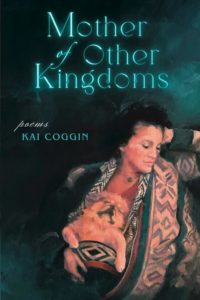 Review by Nicole Callihan
Review by Nicole Callihan
“Can you see why I mother every possible thing?” Kai Coggin asks in Mother of Other Kingdoms. Here, in “Tender and Ache,” the poet has scooped a bumble bee from the windowpane, cupped his slow body, and carried it to a lilac tree. “If you die, at least die happy inside here,” the poet says to the bee. But the bee does not die—not yet anyway—and several hours later Kai witnesses the bee buzzing by—“I’m alive!—” and tells us: “This is how I mother. I rock the smallest species to sleep,/ lullaby our deepest human apologies into their innocent ears.” It is this rocking of the smallest species—this profound attention to each and every soul in the world—which radiates from Kai’s being.
To be as supple and vulnerable as Kai is a wish I have for each and all of us. But it is not simply Kai’s compassion towards all beings—green peppers and dill; prismatic rainbows and paralyzed spiders; queer kids and skywriting poets; light and toil; Alexander and Genghis; her mother and her wife—it is her ability to name and see each of these beings and the “holiness of the infinitesimal.” Here, in the opening poem—
And if we use our words
to name it,
to notice
the unnoticed,
and make it holy with poem—
we consecrate
the mundane
into the sublime
letter
by letter,
line
by line.
There is a sacredness with which Kai approaches each subject, a refreshing unironic reverence.
In “Crashing Toward Light,” Kai situates us in the world as it is, “in the summer of fire in the year of drought in the age of unreasoning in a biosphere of bombing in an epoch of endless suffering—” and then asks, “what of this world is left for poems?” She flips on the switch and discovers a “giant triceratops beetle/ ambling in the dark across [her]kitchen floor,” then tells us that these beetles are known to fly “with a force toward all that is bright and warm.” It is Kai’s manifesto: to recognize darkness but to seek light. In that same poem, with a toothpick, Kai swirls “the cotton candy webs” off a spider and “clean[s]him like he is mine before releasing him back into the wild night.” This tender mothering of the natural world is central to Kai’s vision.
And yet, as with all who mother, there is so much more than caretaking. There is the sexiness of “Talking Dirty” and “the long blue tie from the silk robe…all the times I pull her into me.” There is the subtle humor of “Ode to Raman Noodles,” “as sacrament as surrogate.” There is also the inevitable grief of knowing that to mother one thing comes at the expense of not mothering another. “Is there ever a threshold of tenderness?” Kai asks in “Midwifing Tadpoles in the Anthropocene. “I never want to cross it,” she answers.
What’s essential, though, is the way Kai brings us to that threshold again and again making an altar of tenderness itself. In “Catalog of Receiving,” Kai beautifully bombards us with the gifts of the world. Perhaps the “You” of this poem is Kai’s wife, Joann, but it also feels as if the “you” is the complicated swirl of everything around the speaker—the morning, and mourning; broken glass and dewy grass; vex, and hex, and sex, and feeling beautiful naked finally—the relentless gifts offered and Kai’s unabating acceptance of those gifts. Kai understands that the gifts from the world are multiple. I’m thinking of the “box full of darkness” that Mary Oliver once received, how Kai would place that too on her altar of tenderness.
Kai begins Mother of Other Kingdoms with an epigram from Adrienne Rich: “Without tenderness, we are in hell.” This epigram serves as a harbinger announcing that tenderness is a choice—a choice for Rich, a choice for Kai, a necessary choice for all of us who do not wish to live in hell—and that that chosen tenderness must extend to all beings, and must also be turned inward to ourselves. Of all the beings that Kai mothers in this book, I am most moved by how she mothers her own inner child. “Look at our beautiful breaking world,” Kai writes in “Do You Want to Play Outside?” “It gets so hard, doesn’t it?” she asks. “We can still search out the wonder, can’t we?” And then she takes her inner child “to the lip of the water/ and show[s]her the colors of the golden slick bodies/ glinting the light of morning in slants of sun,” and she takes us and our own inner child with her. She continues:
Maybe that’s the answer, this small world, this ripple of influence,
these beautiful circles in which we swim around
feeling each others pains—
maybe if we take each other’s hands,
if our inner children find each other again
before the maddening of adulthood,
before the cynicism of growth,
before the ache of aging,
maybe if we just knocked on each other’s doors and asked sincerely—
And, oh how vulnerable and sincere Kai is in her asking—Hey, do you want to play outside with me?—and all I can think is: yes, yes, Kai, I do.
Mother of Other Kingdoms by Kai Coggin
Small Harbor Publishing (March 26, 2024)
Paperback,143 pages.
ISBN 978-1957248226
(Excerpted from Nicole Callihan’s introduction to Mother of Other Kingdoms).
Winner of the 2023 Tenth Gate Prize and a 2023 Alma Award, Nicole Callihan has two forthcoming poetry collections: chigger ridge (The Word Works 2024) and SLIP (Saturnalia 2025). Other books include This Strange Garment (Terrapin 2023) and the 2019 novella, The Couples.
